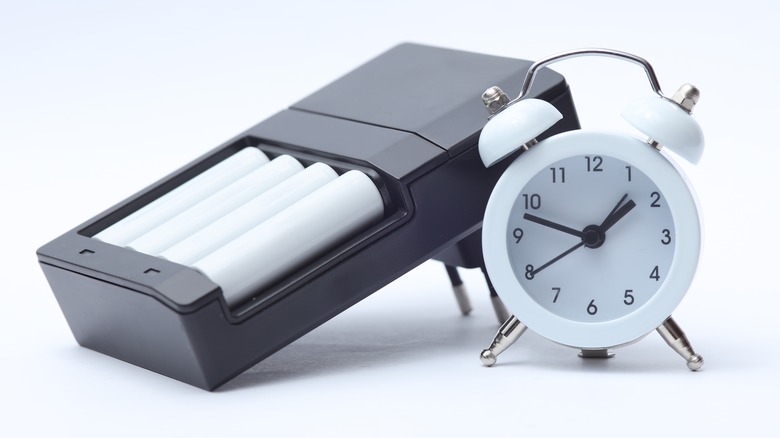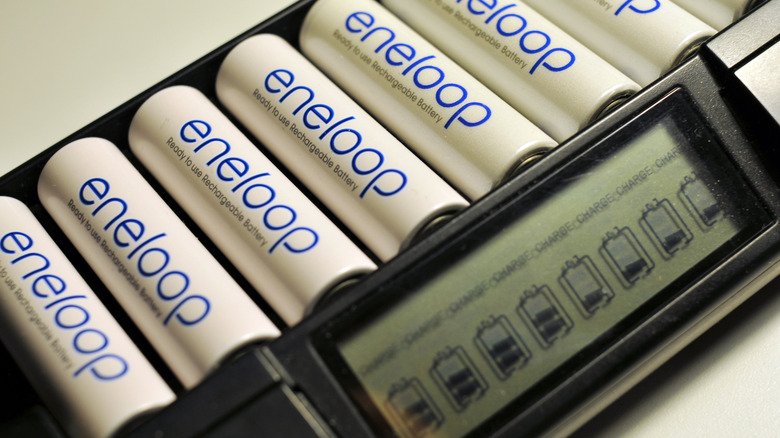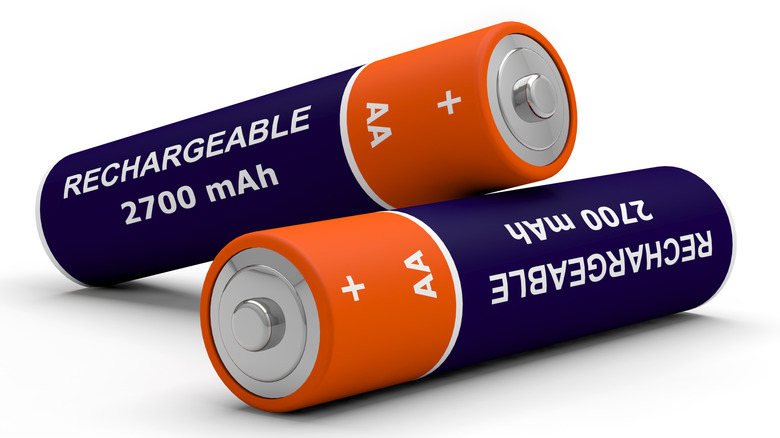How Long Do Rechargeable AA Batteries Keep Their Charge When Stored For Long Periods Of Time?
Not all batteries get used all the time. While the AA batteries in your wall clock, home security camera, or TV remote may get a daily workout, other battery-powered items like flashlights, drones, and game controllers could go weeks or months without being called into service. If you use rechargeable batteries, you probably have a stock of them in your home ready to pop into various gadgets when you want to use them. You've also probably wondered what happens to rechargeable batteries when they're not being used. Do they hold their charge, or does the battery life drain away while they're inactive?
As with most things in life, it depends. All batteries will lose some charge even when not being used. It's known as self-discharge, and it's just part of the lifecycle of a battery. How quickly they do this is mostly down to the type of rechargeable AA battery you're using. The brand of battery can also make a difference, and they'll discharge quicker if they're not stored correctly. Let's look at which batteries perform best and how to help them keep their charge for longer.
Which batteries hold their charge the longest?
There are three main kinds of rechargeable batteries: nickel-metal hydride (NiMH), Low Self Discharge NiMH, and Lithium-ion (Li-ion).
Regular NiMH batteries lose 10–15% of their charge in the first twenty-four hours and then 10–15% each month. If your battery loses 15% of its charge per month, then, after the initial overnight discharge, you'll only have 14% of the initial charge after twelve months. A battery that was 50% charged when you put it in the drawer will only have a 7% charge when you get it out of the drawer a year later.
So, if you plan to store NiMH batteries for any length of time, opt for Low Self Discharge (LSD), which gives far better results. The discharge rate will vary slightly by brand. Panasonic-owned eneloop batteries only lose 0.03% per month, so they will still have approximately 96% of their charge after a year. When eneloop batteries were tested according to an accepted industry standard, they retained 70% of their charge after ten years.
The third type of battery, Li-ion, doesn't hold its charge as well as LSD but is better than standard NiMH. Li-ion batteries are used for things that need lots of power, like digital cameras and wireless microphones. They lose about 5% charge in the first 24 hours, but after that, it is about 1-2% per month. So, after a year of idleness, a Li-ion will have roughly 75%-85 % of its initial charge.
These figures do tend to reflect the best-case scenarios, though, which would include being stored under optimal conditions as laid out by the manufacturer.
How to ensure your batteries keep their charge for as long as possible
If your batteries are poorly made or old, they'll lose their charge quicker. Discharge rates also depend on how much charge is on the battery in the first place. You might think it'd be best to charge a battery up to 100% if you know you're not going to be using it for a while. However, charging to 100% or leaving the batteries in their charger will actually shorten the life of a battery. Similarly, leaving a battery with a low charge will cause it to discharge more quickly, so it isn't recommended. The sweet spot for dormant batteries is 30-50%. This applies to both NiMH and Li-ion types.
Don't leave your batteries anywhere too cold or hot, either. Ideally, they should be stored at room temperature, around 60 to 75 degrees Fahrenheit. Make sure they're not anywhere damp or in direct sunlight. Even though you can leave them for longer, it's a good idea to charge rechargeable batteries every six to nine months, as this will increase their overall lifespan. After all, you want to be able to use and recharge your batteries as many times as possible. However, it's reassuring to know that if you forget about LSD NiMH or Li-ion batteries for a year – or even two – they should still be good to go.


